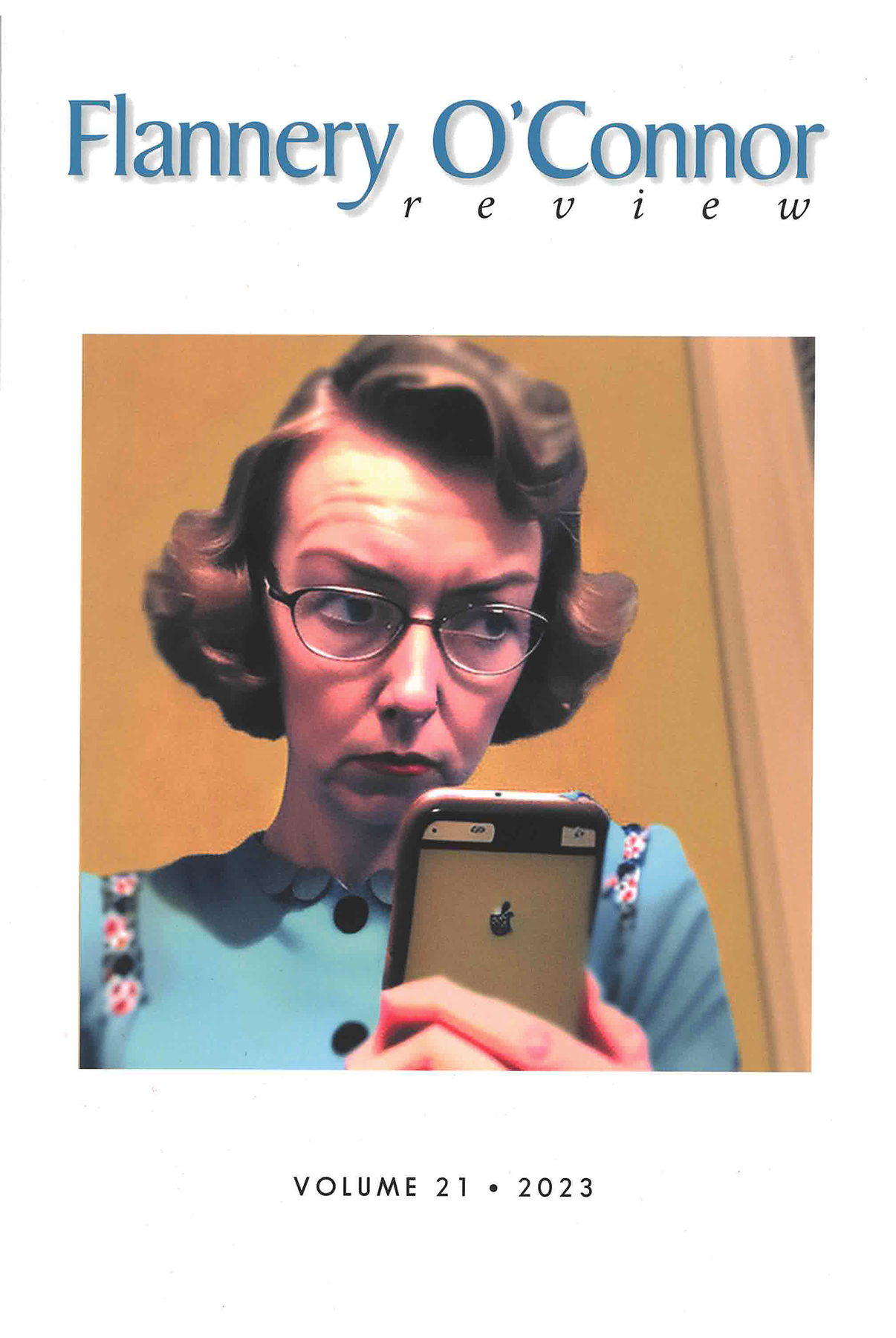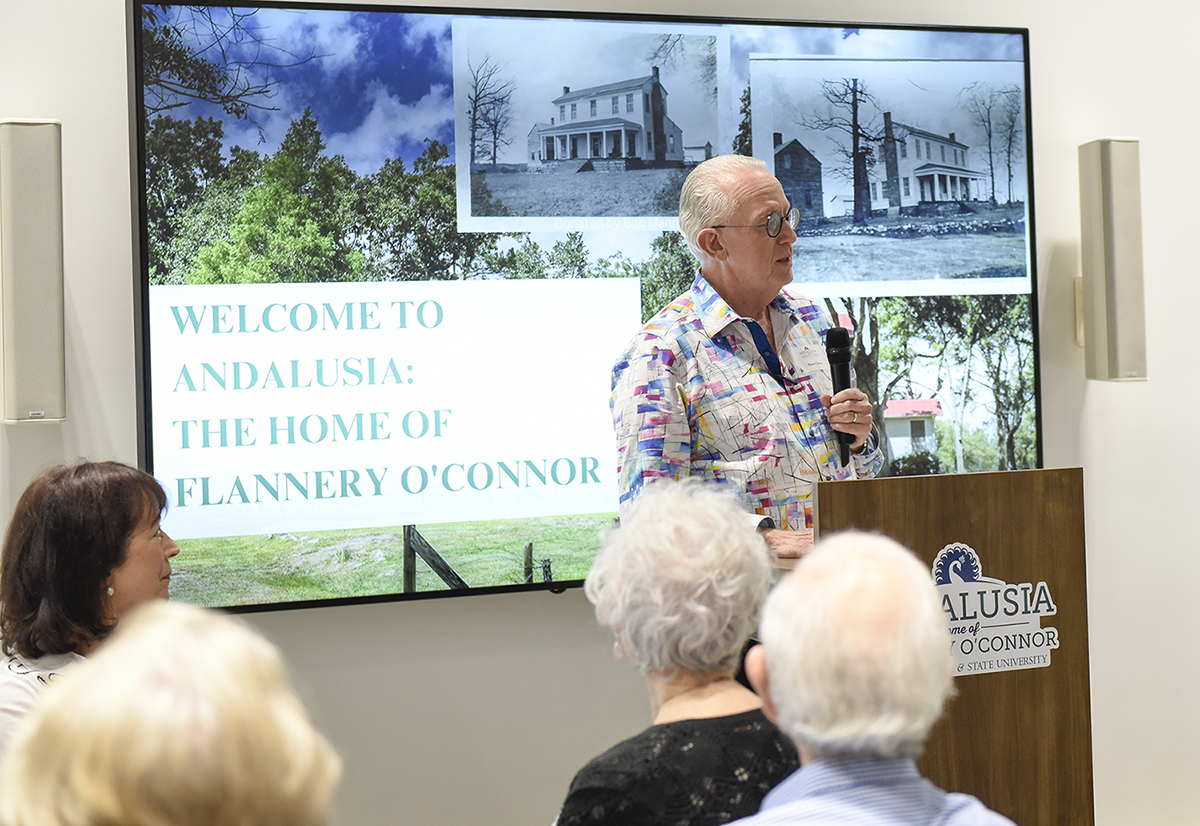O'Connor Scholar Bruce Gentry reflects on decades spent studying Flannery
W ith dozens of academic publications to his credit on the subject of Flannery O’Connor, ’45, you would never know that Dr. Bruce Gentry had a negative reaction the first time he read the famous author’s work.
“The first time I was given a Flannery O’Connor story to read, it scared me,” Gentry said. “I didn’t immediately fall in love with this author. But I couldn’t forget ‘A Good Man Is Hard to Find.’”
Gentry says that as an undergraduate student of English and journalism at the University of Arkansas, his favorite author was Franz Kafka. While perusing a used book sale, Gentry found a book that likened Kafka’s writing to that of O’Connor. So Gentry was determined to give O’Connor another try.
“I’m the rare individual who was hooked on Flannery by reading ‘Wise Blood,’ of all things. That’s not typical,” explains Gentry.
“I thought I was going do other things in college. Then I wrote a paper about O’Connor at one point in graduate school, and the professor wrote at the end of it, ‘I think you’ve got a dissertation topic,’” Gentry said. “I never thought I would have anything to say about that weird author O’Connor. But then it just became an obsession, as these things do.”
Gentry earned his master’s degree in English from the University of Chicago, then his doctorate with an emphasis on American literature from the University of Texas. His continued study of Flannery O’Connor led Gentry to attend an academic conference in Denmark in 2002 where he learned of the opportunity to live and teach at the epicenter of O’Connor scholarship: Georgia College & State University in Milledgeville, Georgia – Flannery’s alma mater, in her hometown.

Gentry’s extensive scholarship includes articles and essays exploring O’Connor’s impact on feminism and gender dialog; reflecting on the author’s use of violence, criminality and “meanness;” and critical comparisons of O’Connor to other authors including Truman Capote, Erskine Caldwell, Alice Walker and others.
“People want to put Flannery in the Southern Gothic genre and put her with Erskine Caldwell and Carson McCullers and others she should have liked, but that she didn’t,” Gentry says. “But her cohort is really authors like Kafka, Dostoyevsky and Dickens. She would place herself with the likes of Walker Percy. And she loved Hawthorne and Conrad.”
For those not familiar with O’Connor’s works or who want to discover the author for the first time, Gentry recommends a trajectory that starts with her later work. He says to begin with “Revelation,” then move on to “Parker’s Back” and “Good Country People.”
“There are a lot of people who start reading Flannery O’Connor and say, ‘Yuck!’ And even people who become great fans often have a very negative emotional reaction at first,” Gentry explains. “In a way they’re right, because if you read O’Connor a lot, you figure out that she didn’t particularly like her audience. She’s attacking. I mean, she’s been beating up on me for 40 years now.”
After more than 20 years as Professor of English at Georgia College and Editor of the Flannery O’Connor Review, Gentry is looking at retirement. But with O’Connor’s continued popularity and even a new movie out about the author – Ethan Hawke’s “Wildcat,” now in limited release – Gentry knows he probably won’t ever stop studying and talking about Flannery. He does hope that his role will evolve.
“I think, in the future, my role in O’Connor studies is going to be to read manuscripts for other people, encourage them and continue to do my book club meetings…I think I did my bit and now we want to see the next generation take over and take charge with me, you know, cheering on the sidelines. Maybe correcting a comma here and there for them,” Gentry says, laughing.

Gentry’s colleagues at Georgia College say his importance to the university and O’Connor scholarship cannot be overstated. Fellow Flannery scholar Dr. Jordan Cofer, professor of English and associate provost for transformative learning experiences at Georgia College, first met Gentry while in graduate school.
“He helped me out as he has done for so many Flannery O’Connor scholars,” Cofer said. “Dr. Gentry has been essential for Georgia College as an amazing professor, and as a Flannery O’Connor scholar. He has edited the journal for many years, and organized conferences for scholars. I’m so glad he agreed to serve as the Flannery O’Connor Institute for the Humanities fellow and continue to lead the monthly book discussions.”
The O’Connor Institute supports Flannery O’Connor scholarship and engages community members with the arts and humanities. Institute programming includes the NEH Summer Institutes on Flannery O’Connor, which are made possible by funding from the National Endowment for the Humanities. Gentry has secured three major NEH grants during his career at Georgia College.
“Dr. Gentry’s teaching and mentoring of undergraduate and graduate students, publications and presentations, editorship of the ‘Flannery O’Connor Review,’ and leadership in organizing and delivering NEH Summer Institutes has strengthened the academic reputation of the university and helped guide future scholars in their understanding of O’Connor,” said Provost and Vice President for Academic Affairs Dr. Costas Spirou.
The Flannery O’Connor Institute for the Humanities is hosting an academic conference this fall, fully funded by their latest NEH grant. “Flannery O’Connor’s Second Century: Looking Forward, Looking Back” is Sept. 12-15 at Georgia College.
Gentry is reviewing conference submissions. He anticipates that at least a quarter of the papers submitted to the conference are going to be about race.
“The article by Paul Elie saying Flannery O’Connor was a terrible racist…that shocked me some. Not totally, but some. I wasn’t used to having people say to me that they couldn’t teach Flannery O’Connor anymore because she was such a terrible racist,” Gentry said.
Literary critic Paul Elie published a piece in The New Yorker in June 2020, titled “How Racist Was Flannery O’Connor?” The subtitle reads, “She has become an icon of American letters. Now readers are reckoning with another side of her legacy.”
“I don’t have much patience for the idea that we shouldn’t teach people who have flaws. People say, ‘Oh, we didn’t know that racism was out there.’ Sure it was. And it was everywhere. And that’s not surprising. This is important and what’s topical. And disability studies, as well. There is a book being written now that is a double biography of Flannery and [her mother] Regina.”
Cofer agrees that O’Connor scholars like himself and Gentry still have a great deal to uncover and study.
“It’s amazing that she has such a relatively small corpus (two novels, two books of short stories, some essays and letters), but that scholars continue to find new aspects of her work to discuss,” Cofer says. “There are hundreds of scholarly books written about her, multiple biographies, thousands of dissertations and we are still finding new things to say about her. In a lot of ways, she was talking about the big issues that humans still care about—and the lessons in her work are still as relevant now as when she wrote them.”

Learn more about the Distinguish Pillar in our Imagine 2030 Strategic Plan
